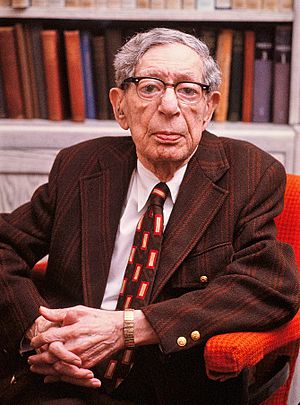Abram Kardiner facts for kids
Abram Kardiner (born August 17, 1891, in New York City; died July 20, 1981, in Connecticut) was an important American doctor who studied the mind. He was a psychiatrist, which means he helped people with their mental health. He also worked as a psychoanalytic therapist, helping people understand their thoughts and feelings.
Kardiner was very active in publishing his research. He helped start a special clinic at Columbia University in New York City. This clinic focused on training and research in mental health. He was very interested in how different cultures affect people's minds. He also studied how people's early experiences shape their personalities. While teaching at Columbia, he created a course about applying psychology to understand culture. He worked closely with experts who study human societies, called anthropologists.
Understanding Trauma
Abram Kardiner is best known for his book The Traumatic Neuroses of War, published in 1941. This book is seen as a very important work about how war affects soldiers' minds. It was updated in 1947 and renamed War Stress and Neurotic Illness. You can even read it online.
Connecting War and Peacetime Trauma
Kardiner's research was based on his work at a hospital for veterans in New York City during the 1920s and 1930s. His study was one of the first to clearly show the links between upsetting experiences in war and those in everyday life. He described many symptoms in his patients. These descriptions were later used to define post-traumatic stress disorder (PTSD) in 1980. PTSD is a condition that can happen after someone goes through a very scary or shocking event.
Other Important Work
Another book Kardiner wrote was The Individual and his Society. In this book, he explored how a person's mind is shaped by the society they live in. He worked with an anthropologist named Ralph Linton on this project.
See also
 In Spanish: Abram Kardiner para niños
In Spanish: Abram Kardiner para niños


